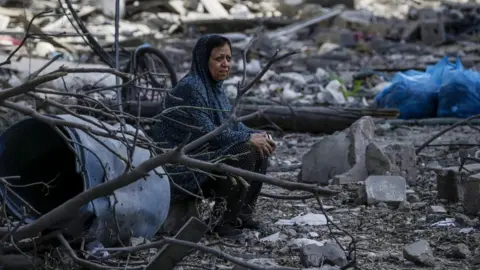'Where do we go?' - Nowhere safe in Gaza as Israeli strikes intensify
"Where do we go? Is there a safe place left in this neighbourhood, which was so quiet and beautiful?" residents of an apartment block in Rimal asked me, with heavy sarcasm.
I had just spent the most difficult seven hours of my life inside there, as Israeli warplanes carried another wave of air strikes in retaliation for the Palestinian militant group's unprecedented assault on southern Israel from the Gaza Strip on Saturday.
The Israeli strikes also caused significant damage to dozens of residential buildings, the offices of telecommunications companies, and faculty buildings of the Islamic University of Gaza.
Terrifying explosions shook the area throughout Monday night. Children were screaming and nobody had a moment's sleep.
It was a night that the residents of Rimal - Gaza City's wealthiest neighbourhood and usually its quietest - will not forget for a long time.
As dawn broke on Tuesday, the intensity of the strikes decreased and people discovered the extent of the destruction. The south-western neighbourhood's infrastructure was severely damaged and most roads leading to it were cut off.
As I drove around it felt as if there had been an earthquake. There was rubble, shattered glass and severed wiring everywhere. Such was the devastation that I did not recognise some of the buildings that I passed.
"I lost everything. My apartment, where my five children lived, was here in this building. My grocery shop below the building was destroyed," Mohammed Abu al-Kass told me while carrying his daughter Shahd in the street.
"Where do we go? We have become homeless. There is no shelter for us anymore or work."
"Are my house and my grocery shop a military target, Israel?" he added, accusing the Israeli military of lying when it says it does not target civilians.
The Palestinian health ministry said that about 300 people, two thirds of them civilians, were killed in Israeli attacks on Gaza on Monday. It was the deadliest day there for many years.
At least 15 people were killed in the densely populated Jabalia refugee camp, north-east of Gaza City, in the afternoon. The Israeli military said it targeted the home of a Hamas commander. But many people at a nearby market or in neighbouring houses were killed.
Humanitarian crisis deepens
The overall death toll in Gaza since Saturday now stands at 900, including 260 children, according to the health ministry. Another 4,500 people have been injured.
The already dire humanitarian crisis in this tiny, overcrowded territory also deepens.
Its 2.2 million residents are running out of food, fuel, electricity and water, after Israel's government ordered a "complete siege" and cut off all of Gaza's supplies in response to Hamas's attack.
Saturday's unexpected assault has killed 1,000 people on the Israeli side, and between 100 and 150 hostages have been taken across the border into Gaza by the militants.
"Can you imagine that we are living without power or water in the 21st Century? My baby has run out of nappies and there is only half a bottle of milk left," said Waad al-Mughrabi as she looked at the destroyed building next to her home in Rimal.
"Was it my child who attacked Israel?"
Outside Gaza's largest supermarket, which had opened for the first time since Saturday, dozens of people were queuing in front of a small back door. They were hoping to buy whatever provisions they could, fearful that the fighting will last a long time.
Most of Gaza's fresh vegetables and fruits are grown in the south of the territory, and the severe fuel shortage means that transporting them to the north will become increasingly difficult.
 EPA
EPASo far, there have been no deliveries of food or other essential goods from Egypt, which has maintained a tight blockade of Gaza for security reasons, along with Israel, since Hamas took over the territory in 2007.
People have also been unable to flee Gaza via the Rafah border crossing with Egypt. Only 400 a day are usually allowed in or out, but Israeli air strikes on Monday and Tuesday hit an entry gate on the Palestinian side, stopping any crossings, the Palestinian interior ministry in Gaza said.
That has forced most of the 200,000 people who have fled their homes to take shelter in UN-run schools. Some have fled in fear, while others have seen their homes destroyed by air strikes.
Some Gazans are choosing to shelter in basements, but they risk being trapped inside if the building above collapses. About 30 families were trapped in one basement alone on Monday night.
"In previous wars, this part of the city was a safe haven for residents of areas on the border [with Israel]," said Rimal resident Mohammed al-Mughrabi.
The Israeli strikes on Monday night showed that nowhere is safe anymore.
